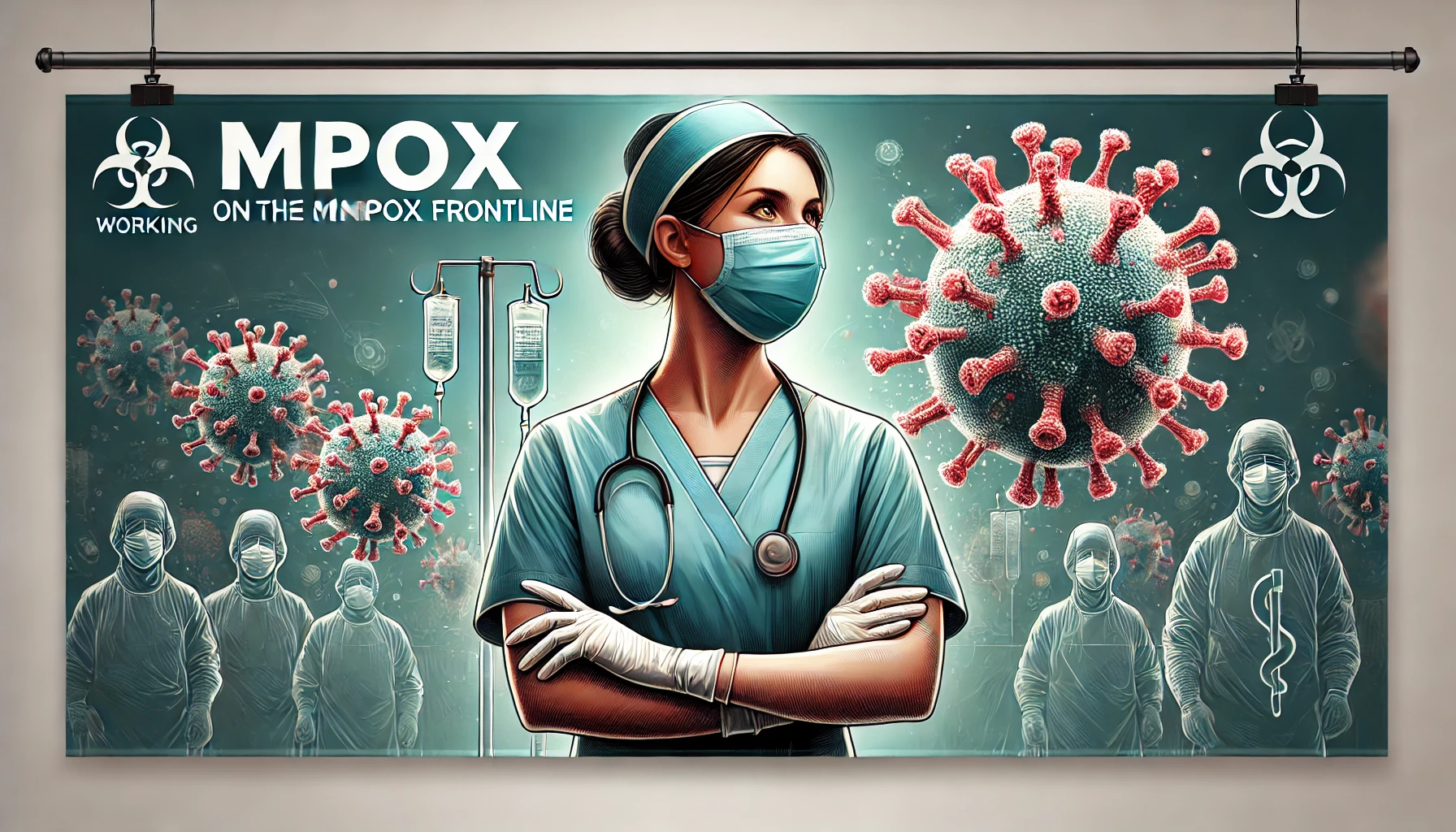Nurses Working in Fear: Inside the Mpox Frontline
As the world faces another viral threat, nurses and healthcare workers are once again at the forefront, battling the mpox outbreak that has been spreading rapidly across multiple countries, including the United States. Mpox, previously known as monkeypox, has instilled fear and uncertainty, especially for the nurses who are working in close proximity to infected patients. As the virus continues to spread, healthcare workers face increasing challenges related to mpox transmission, treatment, and prevention, while simultaneously grappling with mental health issues such as burnout.
In this blog, we will explore the mpox virus, how it spreads, and the toll it is taking on frontline healthcare workers. We’ll also provide insight into prevention strategies, available treatments, and how nurses can protect themselves, both physically and mentally.
Understanding Mpox: Symptoms, Transmission, and Outbreaks
Mpox, part of the Orthopoxvirus family, is similar to the smallpox virus, but it typically presents with milder symptoms. Still, for those infected, it can cause significant discomfort and, in rare cases, severe complications. As of 2024, the mpox outbreak continues to be a public health concern, particularly in regions like the USA, where cases have been rising(American Nurses Association)(HHS.gov).
Mpox Symptoms
Mpox symptoms typically begin with flu-like signs such as fever, headache, muscle aches, and swollen lymph nodes. After these initial symptoms, a rash develops, often starting on the face and spreading to other parts of the body, including the genitals, palms, and soles. The rash evolves from flat lesions to fluid-filled blisters, which eventually scab over and fall off. This entire process can last anywhere from two to four weeks(American Nurses Association).
- Key Symptoms of Mpox:
- Fever and chills
- Swollen lymph nodes
- Body aches and fatigue
- Rash that turns into pustules
- Lesions on hands, feet, and genitals
Most individuals recover without needing extensive medical intervention. However, severe cases may occur, especially in immunocompromised individuals, underscoring the need for healthcare workers to remain vigilant(Nurse.org).
Mpox Transmission
One of the reasons mpox has caused such concern, particularly among healthcare workers, is its method of transmission. While mpox is not as contagious as some airborne viruses like COVID-19, it spreads primarily through close, intimate contact with someone who has the virus. This includes contact with bodily fluids, the virus’s characteristic rash, and contaminated materials like clothing or bedding(American Nurses Association)(Nurse.org).
Healthcare workers face an increased risk due to the nature of their work. Mpox transmission can also occur through respiratory secretions during prolonged face-to-face contact, making personal protective equipment (PPE) critical for healthcare providers on the mpox frontline. Despite these precautions, many nurses express concern about the virus’s spread, especially when they are in direct contact with infected patients.
Mpox in the USA: Outbreak Status and Case Counts
As of 2024, the mpox outbreak continues to affect multiple regions, with significant case counts in the United States. According to the Centers for Disease Control and Prevention (CDC), the number of mpox cases in the USA has surpassed thousands, with healthcare systems in states like California, New York, and Florida facing particularly high caseloads(American Nurses Association)(HHS.gov).
While the CDC has taken steps to control the outbreak, such as recommending mpox prevention strategies and distributing vaccines, the virus continues to pose a threat, especially to high-risk populations. The 2024 outbreak has raised alarms not only because of the number of cases but also due to its rapid spread, partly attributed to international travel and close-contact environments(NETEC).
Mpox Prevention: What Healthcare Workers Need to Know
The ongoing mpox outbreak highlights the importance of preventive measures, particularly in healthcare settings where exposure risk is high. For nurses and other frontline healthcare workers, following strict mpox prevention protocols is crucial to minimize the risk of infection(American Nurses Association).
Vaccination
One of the most effective ways to prevent mpox is through vaccination. The mpox vaccine, known as JYNNEOS, is available for high-risk individuals, including healthcare workers. This vaccine is administered in two doses, spaced 28 days apart, and has proven effective in reducing the severity of the virus in those exposed(Nurse.org)(HHS.gov).
- Who Should Get the Mpox Vaccine:
- Healthcare workers on the frontline
- Individuals who have been exposed to a confirmed case
- High-risk individuals in close-contact settings
Additional Preventive Measures
In addition to vaccination, nurses are encouraged to adopt the following mpox prevention strategies:
- Use of PPE: Always wear gloves, masks, and gowns when dealing with mpox patients.
- Hygiene Protocols: Wash hands frequently and avoid touching the face after patient care.
- Surface Disinfection: Regularly clean surfaces and materials that may have come into contact with the virus.
These precautions are essential in mitigating mpox transmission and ensuring the safety of healthcare workers(HHS.gov).
Mpox Treatment: Options for Patients
Currently, there is no specific FDA-approved antiviral treatment for mpox, but there are therapeutic options available that can help manage the virus, particularly in severe cases. Mpox treatment involves supportive care to relieve symptoms, such as fever reducers and pain medications(NETEC)(American Nurses Association).
For high-risk patients or those with severe symptoms, the antiviral drug TPOXX (tecovirimat) is recommended. This medication has shown promise in reducing the duration and severity of the illness, particularly in patients who are immunocompromised(NETEC).
Mental Health and Burnout: The Impact on Nurses
Amid the rising number of mpox cases, the mental health of nurses and frontline healthcare workers has become a growing concern. Many nurses are working long hours under the stress of potential exposure to a highly contagious virus, all while dealing with the emotional strain of caring for critically ill patients. This has led to widespread reports of nurse burnout(Nurse.org)(HHS.gov).
Nurse Mental Health: A Growing Crisis
Nurse mental health has always been a concern, but the mpox outbreak has exacerbated the issue. The constant fear of infection, coupled with the overwhelming patient load, has left many nurses feeling exhausted and emotionally drained. Burnout in healthcare workers is not just a personal issue; it affects patient care, as exhausted nurses are more likely to make errors(Nurse.org).
- Signs of Burnout:
- Emotional exhaustion and detachment
- Decreased job satisfaction
- Physical symptoms like headaches and fatigue
- A sense of ineffectiveness or lack of accomplishment
Combating Burnout on the Mpox Frontline
To support nurses and reduce healthcare worker burnout, institutions must implement measures to protect not only their physical health but also their emotional well-being. Strategies such as mental health support programs, debriefing sessions, and adequate time off can make a significant difference in helping nurses cope with the stress of working during an outbreak(Nurse.org).
Nurses on the Mpox Frontline
Nurses working on the mpox frontline face a host of challenges, from the fear of mpox transmission to the emotional toll of caring for sick patients. The mpox outbreak has stretched healthcare systems, but it has also highlighted the resilience and dedication of frontline healthcare workers. To effectively manage this ongoing crisis, healthcare institutions must prioritize mpox prevention, ensure timely access to vaccines and treatments, and address the mental health needs of their staff.
For more insights on healthcare challenges and mental health support for nurses, visit Regent Studies. Additionally, you can learn more about mpox symptoms, transmission, and treatment by visiting the CDC’s official page on Mpox.




